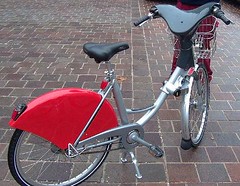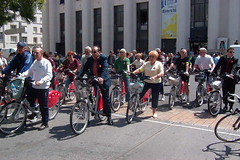From car-sharing to bike sharing
 Rentabike in Lyon, France. Photos from lyoncyclable.free.fr.
Rentabike in Lyon, France. Photos from lyoncyclable.free.fr.In "Rentabike moves up a gear from curiosity to runaway success," the Guardian reports about a bikesharing program in Paris. Unlike the old free bikes (I remember a friend of mine launching a "Greenbike" free bike sharing program in Ann Arbor almost 20 years ago), these bikes are rented and locked, which limits severely the likelihood of vandalism.
From the article:
The French are not short of groundbreaking cheap and efficient public transport. But now the Paris Metro and the high-speed TGV have a more humble, although no less hi-tech, equal - the Lyon rentabike. Less than three months after its launch, the city's Vélo'v scheme, reportedly the largest of its kind in the world, is a runaway success. "Very quickly, we've moved from being a curiosity to a genuine new urban transport mode," said Gilles Vesco of the city council.
Some 15,000 Lyonnais are now registered users, and the 24-hour scheme's 1,500 sturdy silver-and-red bikes - which have three gears, a handlebar basket and a lock - are detached from their 100-odd computerised racks on average 6.5 times each a day. And this is just the beginning: by 2007, there should be 4,000 cycles and up to 400 racks in the city - which is one roughly every 300 metres.
Collective bike schemes started in the 1960s with the free "white bikes" of Amsterdam and Copenhagen, schemes which laboured under the hippy-era illusion that most users would be public-spirited enough to return bikes after use. They were not.
The Lyon scheme adopts a system pioneered, on a much smaller scale, in Vienna and incorporates strong incentives not to abscond. Users must register in advance so that their personal details are on record, and they are then issued with a security code and a prepaid card, which they can top up at each rack's computer terminal. Our success reflects a cultural shift that you could call collective individualism," Mr Vesco told the daily Libération. "Everyone chooses their own destination, route and timetable, but they use a collective means of transport." ...
Vélo'v is, apparently, a simple system to use, and is also cheap. With the prepaid card, which costs one euro for a week and five euros for a year, rental costs one euro an hour, with the first half-hour free. In practice, that means borrowing a bike is as good as free, since 90% of all Vélo'v journeys last less than 30 minutes. It is funded by JC Decaux, the billboard multinational, which agreed to launch and operate the bike scheme in part-exchange for the right to sell advertising space on the city's bus and tram shelters.
_____________
Maybe a program like this could be combined with the Bikestation proposal for Union Station.
 Enthusiastic rentabike users in Lyon.
Enthusiastic rentabike users in Lyon.



2 Comments:
You have brought up a very good points , thankyou for the post.
yes definitely car sharing is very important by far, but car rental is also very useful thing , i actually use it myself and im completly satisfied with it !
Post a Comment
<< Home